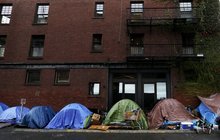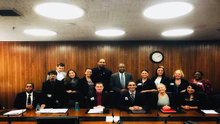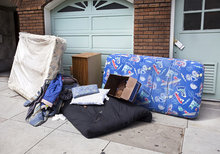Found 464 resources.
0
0
0
Community Land Trusts (CLTs) are nonprofit, community-based organizations that steward land for specific community purposes. They are used to expand and preserve low- and moderate-cost housing, sustain commercial and civic assets, and foster neighborhood engagement through stewardship of the land. Although typically used as an approach for shared equity homeownership, CLTs can also stabilize housing access, increase affordability, revitalize properties in disinvested communities, and enable renters to participate in community governance processes.
Topics: Community development, Housing, Low-income
0
0
0
Advocacy is everyone's job and it is essential to the children and communities we serve. CLPHA’s Education Working Group hosted a webinar to learn about advocacy efforts to build support and investment in housing. Representatives from Partnership for Children and Youth (PCY) – a California-based advocacy organization that promotes and supports learning opportunities for underserved students – discussed strategies for providing, sustaining, and increasing access to Out-of-School-Time services in housing. PCY also touched on a range of advocacy strategies and preliminary results from the...
Topics: CLPHA, Education, Housing, Housing Is Working Group, Legislation & Policy, Out-of-school time, Partnerships, Youth
 Shared by Housing Is
on Apr 10, 2019
Shared by Housing Is
on Apr 10, 2019 0
0
0

Houston children continue to be poisoned by lead even though childhood lead poisoning is considered the most preventable environmental disease among young children. In the past three years, almost 1,200 Houston children between 0 and 72 months old were found to have lead in their blood above the reference value of concern set by Centers for Disease Control and Prevention. The Houston Health Department (HHD) has hosted the Lead-Based Paint Hazard Control Program (LBPHCP) for over 25 years, with the goal of providing a lead-safe home environment through home investigations and home lead...
Topics: Early childhood, Health, Housing, Lead, Partnerships, Safety
 Shared by Housing Is
on Apr 8, 2019
Shared by Housing Is
on Apr 8, 2019 0
0
0
The Legal Bibliography is collection of 100+ papers, toolkits and other materials focused on privacy, consent and policy documentation. Co-developed by the Network for Public Health Law and Data Across Sectors for Health (DASH), the Bibliography is a growing resource for lawyers and community data practitioners, intended to support local collaboratives in their efforts to share data across sectors.
Topics: Criminal justice, Data sharing, Education, Health, Homelessness, Housing, Mental health, Partnerships, Safety
 Shared by Housing Is
on Apr 8, 2019
Shared by Housing Is
on Apr 8, 2019 0
0
0
While the program has changed very little since its inception, the need for the program has increased. In 1975, the number of program grantees stood at 594. Today, the number of grantees stands at 1,268 as more communities qualify to receive direct program allocations. Based on a CDBG Needs Survey conducted by the CDBG Coalition (and discussed later in this report), CDBG grantees have delayed and canceled projects and reduced or permanently eliminated programs because of a lack of CDBG funds. CDBG is an important investment tool for communities and neighborhoods, but program funding must...
Topics: Community development, Funding, Health, Homelessness, Housing, Legislation & Policy, Low-income, Partnerships, Research, Safety, Seniors
 Shared by Housing Is
on Apr 8, 2019
Shared by Housing Is
on Apr 8, 2019 0
0
0
We're creating the foundations of change. Together, we can provide more families with access to a safe place to live.
Topics: Community development, Housing, Legislation & Policy
 Shared by Housing Is
on Apr 8, 2019
Shared by Housing Is
on Apr 8, 2019 0
0
0
The Department of Housing and Urban Development issued a proposed rule Wednesday to improve its Section 3 Program, which requires funding recipients to employ low-income people and business.
Topics: Asset building, Housing, Legislation & Policy, Low-income, Metrics, Place-based, Workforce development
 Shared by Housing Is
on Apr 8, 2019
Shared by Housing Is
on Apr 8, 2019 0
0
0

Building more affordable housing units in the metros that are centers of innovation will increase demand for the wares that fill houses, and increase productivity.
Topics: Asset building, Community development, Housing, Legislation & Policy, Research
 Shared by Housing Is
on Apr 4, 2019
Shared by Housing Is
on Apr 4, 2019 0
0
0

As Wilmington’s Riverside community embarks on an extraordinary revitalization effort, Christiana Care Health System is making an impact on health with a $1 million gift to REACH Riverside Development Corporation that will support community health and youth development programs.
Topics: Community development, Health, Housing, Low-income, Youth
 Shared by Housing Is
on Apr 4, 2019
Shared by Housing Is
on Apr 4, 2019 0
0
0
The Homeless Children and Youth Act of 2019 (H.R. 2001) is a bipartisan bill that removes barriers to U.S. Department of Housing and Urban Development (HUD) homelessness assistance for children, youth and families in the following ways.
Topics: Early childhood, Homelessness, Housing, Legislation & Policy, Youth
 Shared by Housing Is
on Apr 4, 2019
Shared by Housing Is
on Apr 4, 2019 0
0
0
The nation has large, pressing infrastructure needs, which are often felt most acutely in low-income communities due to decades of policy choices and lack of public and private investment. As federal lawmakers consider investing in infrastructure, a core priority should be to direct substantial resources across a range of areas to low-income communities, which could expand their access to safe living conditions and economic opportunity.
Topics: Education, Funding, Health, Housing, Legislation & Policy, Low-income, Safety, Transportation
 Shared by Housing Is
on Apr 4, 2019
Shared by Housing Is
on Apr 4, 2019 0
0
0

A comprehensive plan would increase King County residents’ confidence in local efforts to address the region’s homelessness crisis, and seeing fewer people living on the streets would prove that it’s working, according to a new poll. Conducted in February by Seattle-based Elway Research, the poll is the latest to explore county residents’ complex feelings about the homelessness crisis and the long-running effort to resolve it.
Topics: Homelessness, Housing, Legislation & Policy, Low-income
 Shared by Housing Is
on Apr 4, 2019
Shared by Housing Is
on Apr 4, 2019 0
0
0
Thoughtful and thorough preparations for the disruptive effects of global climate change can provide a range of options for communities and households that would respect their historical assets, current and potential levels of social cohesion, desires for their own life outcomes, and opportunities for collective
action. In all cases, people and communities should exercise meaningful voice and power over decisions about where, how, and how much to adapt to local climate effects. Regardless of the combination of physical and social interventions communities adopt, inclusion and equity must be...
Topics: Housing, Legislation & Policy, Research, Sustainability
 Shared by Housing Is
on Apr 4, 2019
Shared by Housing Is
on Apr 4, 2019 0
0
0
Public transportation provides critical connections to jobs, education, and health care, especially for low-income families without a vehicle. But improving transit access can be a double-edged sword. Although low-income riders are the most dependent and reliable transit users, investments in public transportation can increase land values and attract new development catered to high-income earners, ultimately displacing the households that would benefit most from improved access.
Topics: Housing, Low-income
 Shared by Housing Is
on Apr 4, 2019
Shared by Housing Is
on Apr 4, 2019 0
0
0
The Keeping Families Together model turned the usual paradigm for prioritizing affordable housing on its head. Rather than targeting the most “stable” families, Keeping Families Together sought out families with the most complicated cases—those at greatest risk. Thanks to this approach, families once on the brink of crisis now have a permanent place to call home, as well as the services and support they need to stay together.
Topics: Child welfare, Family engagement, Homelessness, Housing, Low-income, Partnerships, Research, Supportive housing
 Shared by Housing Is
on Apr 4, 2019
Shared by Housing Is
on Apr 4, 2019 0
0
0
The Housing and Medicaid Services Pilot Program in Indianapolis, also known as the Blue Triangle Housing Program, is a collaboration that includes Anthem, the City of Indianapolis, a non-profit housing organization, and a community mental health center (CMHC).
Topics: Health, Housing, Medicaid / Medicare, Midwest, Partnerships, Supportive housing
 Shared by Housing Is
on Apr 4, 2019
Shared by Housing Is
on Apr 4, 2019 0
0
0
CSH selected the Center for Data Science and Public Policy (DSaPP) at the University of Chicago to develop a web-based data integration tool, which was completed in 2018. The tool connects county jail administrative data from the justice system to homeless system data, through communities’ Homeless Management Information Systems (HMIS).
Topics: Criminal justice, Data sharing, Homelessness, Housing, Midwest, Partnerships, Supportive housing
 Shared by Housing Is
on Apr 4, 2019
Shared by Housing Is
on Apr 4, 2019 0
0
0

A group called the Fostering Stable Housing Opportunities (FSHO) Coalition — which includes Callahan’s youth-led ACTION Ohio and the National Center for Housing and Child Welfare — met in early March with Housing and Urban Development (HUD) Secretary Ben Carson to lay out a plan for a $20 million voucher program aimed at preventing homelessness for transition age foster youth. Under that plan, HUD would use an existing pot of money to provide on-demand vouchers and assistance for foster youth who needed stable housing.” HUD is currently reviewing the proposal to determine the agency’s...
Topics: Child welfare, Foster care, Funding, Housing, Legislation & Policy
 Shared by Housing Is
on Apr 2, 2019
Shared by Housing Is
on Apr 2, 2019 0
0
0
Federal safety net programs are intended to protect the most vulnerable Americans—such as the elderly, people with severe disabilities and young children. Housing assistance plays a critical role in the safety net, providing decent, safe, and affordable housing for millions of extremely low-income and vulnerable families—though, because it is not an entitlement like other federal safety net programs, the assistance available falls far short of the need. Housing subsidies free families to spend on other essentials like healthy food, education, and health care.
Topics: Asset building, Dual-generation, Education, Housing, Mental health, Mobility, Partnerships, Research, Workforce development
 Shared by Housing Is
on Apr 2, 2019
Shared by Housing Is
on Apr 2, 2019 0
0
0
On March 28, 2019, the campaign released the results of a national public opinion poll that it commissioned through Hart Research Associates. The poll is the first in several years to extensively assess the extent to which the public considers housing affordability to be a problem in their communities, whether they have had to make sacrifices in other areas of life because of housing costs, whether they expect action from elected officials, whether they are more likely to vote for a candidate that has a detailed plan to address the problem, and their openness to the specific policy solutions...
Topics: Housing, Legislation & Policy, Research
 Shared by Housing Is
on Apr 2, 2019
Shared by Housing Is
on Apr 2, 2019 0
0
0
A shortage of affordable housing on this island territory has forced hundreds of families to remain in damaged and leaky houses during the lengthy recovery effort. The widespread destruction of hotels and public housing, combined with the flood of workers who have rushed to the islands to aid in rebuilding, have pushed rents higher, beyond the means of many disaster victims.
Topics: Community development, Housing, Low-income, Safety, U.S. Territories
 Shared by Housing Is
on Apr 2, 2019
Shared by Housing Is
on Apr 2, 2019 0
0
0

Community First! Village is built and run by the nonprofit Mobile Loaves & Fishes to lift the most chronically homeless off the streets and into a place they can call home. They live in about 100 RVs and 125 micro homes arranged on streets with names like "Peaceful Path" and "Goodness Way." Heavy machinery has broken ground on the neighboring 24 acres to add another 310 housing units. When complete, Mobile Loaves and Fishes believes it will be able to provide permanent homes for approximately 40% of the chronically homeless in Austin.
Topics: Community development, Homelessness, Housing, Place-based, South
 Shared by Housing Is
on Mar 28, 2019
Shared by Housing Is
on Mar 28, 2019 0
0
0

Georgia State University authors suggest requiring longer rental eviction notice periods and boosting legal representation for tenants
Topics: Homelessness, Housing, Low-income, Research
 Shared by Housing Is
on Mar 28, 2019
Shared by Housing Is
on Mar 28, 2019 0
0
0
The problem of housing affordability, long a concern in popular big cities, has moved to rural America. Nearly one-fourth of the nation’s most rural counties have seen a sizeable increase this decade in the number of households spending at least half their income on housing, a category the federal government calls “severely cost-burdened.”
Topics: Homelessness, Housing
 Shared by Housing Is
on Mar 28, 2019
Shared by Housing Is
on Mar 28, 2019 0
0
0

Many former offenders are denied housing — not because of the lack of funds or the failure to meet objective criteria, but because of their criminal history. Case in point: Matthew Charles, one of the first prisoners released under the First Step Act and one of President Trump’s guests at the State of Union address in February, has had difficulty securing an apartment, even with help from Kim Kardashian West.
Topics: Criminal justice, Homelessness, Housing

